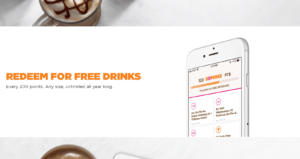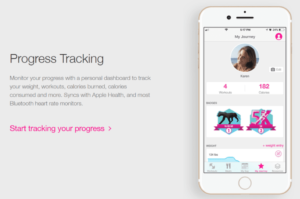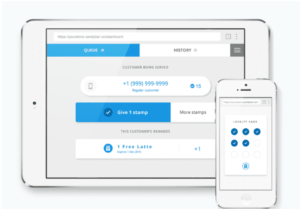Customer loyalty programs enable you to focus on profiting from customers who know, like and trust your brand. Loyalty programs keep customers coming back and spending money at your place of business. However, they can be poorly designed or they can help you scale your business and take it to the next level.
First and foremost, you’ll want to ensure that your product is top-notch. According to Yotpo, 55.3% of consumers are brand loyal because they love the product.
The second thing that encourages brand loyalty at 25.7% is great deals. Presenting enticing deals to your customers can encourage them to come back.
Rewards programs will track the spending behaviors of your customers and provide you with valuable insights as to what your customers like and will keep them coming back to your store.
The more that customers frequent your store, the more opportunities you have to make a sale.
Customer Loyalty Programs Increase Customer Retention
Customer loyalty programs are designed to increase customer retention. By creating great deals, the second factor in customer loyalty, your existing customers will be motivated to make additional purchases from you.
The customer retention rate is the rate that your customers return to make purchases each month. As the retention rate grows, you can reduce your spending on customer acquisition marketing and focus in on referral marketing and marketing to your base.
Loyal customers have a greater conversion rate. They will be more profitable when you market to them. Loyal customers tend to make more frequent purchases and spend more on their purchases.
When you increase your retention rate by 5 percent, it is possible to increase your profits by 25-95%.
Loyalty Programs Reduce Marketing Costs
Once you have a solid retention rate that ensures a nice stream of customers, you can shift the focus to creating an effective loyalty program.
Loyal customers who already love your brand will enjoy receiving discounts on their favorite products. They may even spread the word about your brand in exchange for a referral bonus.
When constructed well, loyalty programs can be much more profitable than general marketing and customer acquisition.
4 Ways to Encourage Repeat Business
The main benefit of a customer rewards program is a personalized experience for the customer. The more personalization that you can offer, the more loyal your customer will be.
As you gather more information and feedback from your customers, you know what will bring them back. Simply offer it to them so they’ll select your store over the one across the street.
Get engaged with your customers. They’ll feel that you care about them, which is something that is becoming rare in this technology-driven world.
Engagement builds that emotional connection that everyone is seeking.
1. Offer Value With Your Loyalty Program
Many loyalty campaigns fall short of success because they only offer discounts based on what the customer spends. Discounts are easy to find with a google search.
An effective loyalty program will offer more than a simple discount. It will share valuable information. Effective loyalty programs also connect with customers on a personal level and may offer birthday gifts and seasonal rewards.

Dunkin Donuts is one restaurant that is crushing it with their loyalty program. They reward their customers for simply signing up. On the customer’s birthday, they also receive a free coffee. Dunkin Donuts customers love free coffee and they use that to their advantage in their marketing.
2. Gamify Your Program’s Offers
“The more you engage with customers the clearer things become and the easier it is to determine what you should be doing.” – John Russell
Sports and games are loved by many. They fuel the competitive nature and make earning loyalty points fun.
Creating a game out of the shopping experience can turn it into something more exciting and fun that your customers will want to do more often. Loyalty programs that allow customers to earn rewards for completing certain actions can motivate customers. Some actions that can be rewarded are signing up for an email list, referring a friend.
A simple way to gamify loyalty programs is by assigning points to tasks and rewarding the customers for earning points, which they can then redeem for future purchases.
Other Gamification types:
- Redeemable points – Earn points for certain tasks that you can redeem on your next purchase.
- Badges – Customers can earn badges after completing more complicated tasks, such as a 30-day challenge.
- Performance Graphs – Track the customer’s progress through a graph that will motivate them to continue their engagement.
Jillian Michaels incorporates gamification with her customers through her fitness app. She rewards her customers with badges for tasks completed. These are charted on a performance graph.

Jillian Michael’s app works well as it incentivizes her customers to engage with her more. The app works well and customers pay a monthly subscription fee to continually engage with Jillian.
Red Robin’s Royalty program gamifies earning free hamburgers. Red Robin tracks customers’ purchases and allows customers to see when they’ll earn another one.
Quizzes and games are very interactive and can help you to effectively get to know your audience very well. In fact, you can effectively use games for marketing.
3. Provide A Deeper Connection
“If people believe they share values with a company, they will stay loyal to the brand.” – Howard Schultz
Brands that align with charitable causes will attract many people who are searching to make a difference in the world. Many people want to feel that they share values with the stores where they make purchases.
Customers may feel that your values are very similar to theirs when you align your company with a charity that they support. Many customers will feel more connected to you on social issues in addition to shopping. This can create a powerful bond.
If your target market is liberal, you may want to use this strategy. Seventy-eight percent of liberals want the brands that they shop with to take a stand. Nearly 60% of all customers are more willing to shop with a brand who is supporting a cause.
One example of a charity partnering with a Brand is Lyft’s Round-Up program. Lyft enables users to round their fares up to the nearest dollar and donate the change to a cause of their choice.

4. Use a Digital Loyalty Program
Many stores pass out punch cards that get lost or forgotten about. While punch cards are inexpensive and easy to implement, there are some major downsides to using punch cards for your loyalty program.
First and foremost, they are easily lost. This means the customers won’t be using them and returning to your store.
The second downside is that they don’t collect data on your customers. Digital loyalty programs are able to track the buying habits of your customers.
Finally, punch cards do not facilitate communication between the business and the customer. Digital loyalty programs allow for text messaging and email communication.
Loyalty reward apps, such as CandyBar, allow customers to give retailers feedback through polls, check their rewards status and redeem points.

People keep their mobile phones with them all the time. Therefore, having a loyalty program accessible through a mobile device is ideal. Customers can check to see if they have earned free items through the app.
They also probably won’t forget their cards when they go shopping. This makes the points easier to redeem.
Most importantly, business owners are able to track customer data and spending habits. This helps them to improve their business.
Conclusion
The four essential elements of an effective customer loyalty program are a value component, gamify the offer, create a deeper connection and go digital! Creating an effective loyalty program does not need to be a huge project. You can get started gathering information about your customers with a digital program that can be set up in minutes.
Once your program is up and running, you need to continually measure the success of your rewards program.


